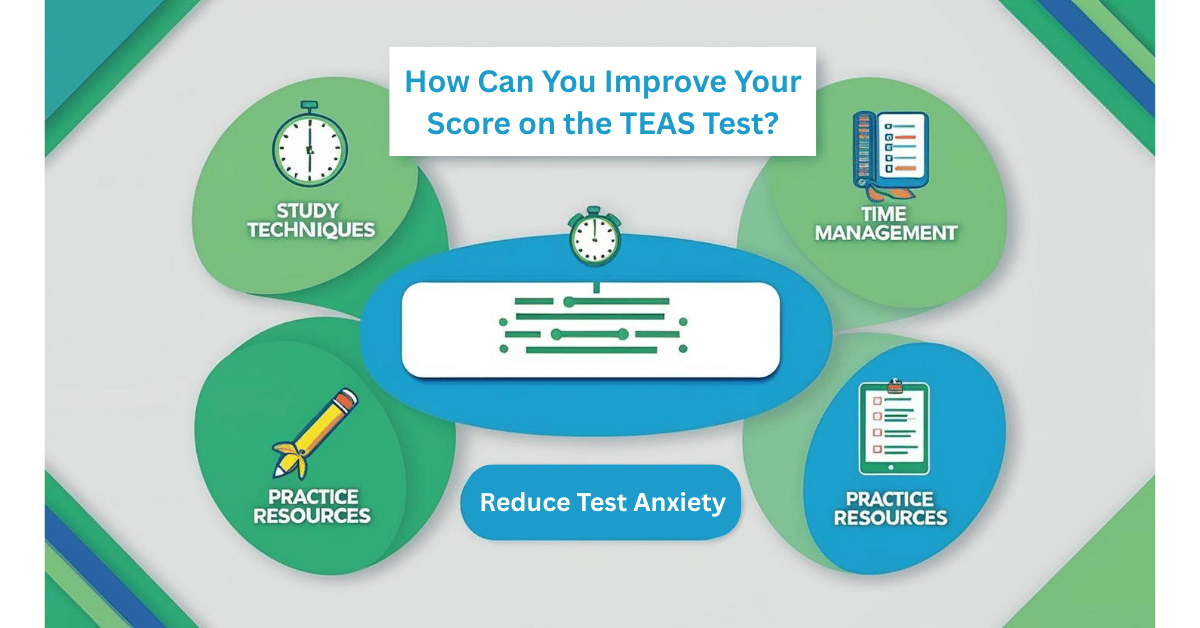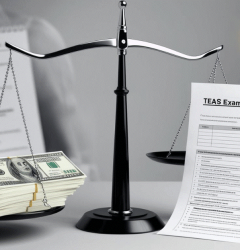- Email: hello@Tutoriffic.com
- Phone: (714) 941 0782
08 Mar

Improve your score on the TEAS test by using the right study strategies, practice tests, and time management techniques. A strong performance on this exam is essential for gaining admission into nursing and allied health programs. Since the TEAS assesses your skills in reading, math, science, and English, focused preparation is key.
Many students find certain sections challenging, but with a structured study plan and the right resources, you can boost your confidence and achieve a competitive score. This guide will walk you through the best techniques to help you prepare effectively and maximize your TEAS test results.
The TEAS Exam Structure
Before you start studying, you need to know what to expect on the exam. The TEAS test consists of four main sections:
| Section | Number of Questions | Time Limit |
|---|---|---|
| Reading | 45 | 55 minutes |
| Mathematics | 38 | 57 minutes |
| Science | 50 | 60 minutes |
| English and Language Usage | 37 | 37 minutes |
This means you have limited time per question, making time management a crucial skill for success.
Top Strategies to Improve Your Score on the TEAS Test
1. Use High-Quality Study Materials
Invest in reputable TEAS study guides, practice tests, and online courses. The official ATI TEAS study materials provide the best insight into the actual test format. Other useful resources include flashcards, video tutorials, and subject-specific textbooks.
2. Take TEAS Practice Tests Regularly
Taking full-length TEAS practice tests helps you:
✔ Identify weak areas
✔ Get familiar with the question format
✔ Improve time management
Aim to take a practice test at least once a week leading up to your exam date.
3. Develop a Structured Study Plan
A study plan helps keep you organized and ensures you cover all sections effectively. Here’s a 6-week TEAS study plan:
- Week 1–2: Focus on weak subjects and review the test format.
- Week 3–4: Take practice tests and refine test-taking strategies.
- Week 5–6: Review mistakes, strengthen time management, and take final practice tests.
Break your daily study time into manageable sessions of 1-2 hours to avoid burnout.
4. Join a Study Group or Get a Tutor
Studying with a group or working with a TEAS tutor can provide valuable insights, explanations, and accountability. If you struggle with self-discipline, a tutor can help tailor study strategies to fit your learning style.
5. Consider Professional Assistance
If you’re short on time or struggling with the material, you may consider professional help. Some students choose to:
These services can help you achieve a higher score while focusing on other priorities. However, ensure you choose a reliable and confidential service.
6. Master Time Management
Since the TEAS test is timed, efficiency is key. Here’s how to manage your time effectively:
✔ Don’t spend too long on a single question—move on if you’re unsure.
✔ Answer easier questions first and return to difficult ones later.
✔ Use the process of elimination to narrow down multiple-choice answers.
7. Reduce Test Anxiety
Many students struggle with test anxiety, which can negatively impact performance. Try these techniques to stay calm:
✔ Practice deep breathing exercises before and during the exam.
✔ Get enough rest and eat a healthy meal before the test.
✔ Build confidence by taking multiple practice tests in a timed setting.
8. Be Fully Prepared on Test Day
To avoid last-minute stress, follow these steps on exam day:
✔ Arrive early at the testing center.
✔ Bring all required documents (valid ID, confirmation email, etc.).
✔ Wear comfortable clothing to stay relaxed.
✔ Use your breaks wisely—hydrate and stretch.
9. Focus on Weak Areas First
Don’t waste time reviewing material you already know—focus on the areas where you struggle.
- Identify your weakest subjects and allocate extra study time to them.
- Use practice questions and quizzes specifically for your problem areas.
- Break down difficult topics into smaller, more manageable sections.
10. Improve Your Reading Speed and Comprehension
The Reading section requires you to quickly analyze passages and answer questions accurately.
- Practice reading scientific and medical articles to improve comprehension.
- Skimming and scanning techniques are used to locate key information faster.
- Summarize passages in your own words to check your understanding.
11. Brush Up on Basic Math Skills
Many students struggle with TEAS math because they forget fundamental concepts.
✔ Review basic arithmetic (fractions, decimals, percentages).
✔ Practice word problems and algebra regularly.
✔ Learn measurement conversions commonly used in healthcare settings.
12. Learn and Memorize Key Science Concepts
The Science section covers a wide range of topics, including biology, chemistry, anatomy, and physiology.
✔ Use flashcards to memorize human body systems and medical terminology.
✔ Understand basic chemistry principles such as the periodic table and chemical bonds.
✔ Review cell biology, genetics, and DNA for biology-related questions.
13. Use Mnemonics and Memory Techniques
Memorizing complex information can be easier with mnemonics and memory tricks.
✔ Use acronyms like PEMDAS (Parentheses, Exponents, Multiplication, Division, Addition, Subtraction) for math.
✔ Create rhymes or songs to remember difficult concepts.
✔ Associate visual images with key facts to improve recall.
14. Set Achievable Study Goals
Setting small, realistic goals will keep you motivated and on track.
✔ Aim to learn 10 new vocabulary words per day.
✔ Solve 20 math problems daily to build accuracy and speed.
✔ Focus on one science topic at a time instead of cramming multiple subjects.
15. Take Advantage of Online Study Forums and TEAS Prep Group
Join TEAS study groups online to exchange tips, ask questions, and get support.
- Engage in discussions to reinforce learning.
- Share practice resources with other students.
- Get answers to tough questions from experienced test-takers.
16. Practice Under Timed Conditions
Since the TEAS is a timed test, practicing under similar conditions is important.
✔ Set a timer when answering practice questions.
✔ Learn to pace yourself to avoid running out of time.
✔ Simulate the real test environment for better preparation.
17. Avoid Cramming Before the Test
Cramming increases stress and decreases retention. Instead:
✔ Space out studying over several weeks.
✔ Use the night before the exam for light review and relaxation.
✔ Get a good night’s sleep to stay sharp on test day.
18. Use a Variety of Study Methods
Mixing different study techniques helps reinforce learning. Combine textbook reading, video lessons, practice tests, and hands-on exercises for a well-rounded preparation.
19. Stay Physically and Mentally Healthy
Your brain functions best when you take care of your body. Ensure you:
✔ Get at least 7-8 hours of sleep per night
✔ Stay hydrated and eat brain-boosting foods like nuts, berries, and fish
✔ Take regular study breaks to avoid burnout
20. Review Your Practice Test Mistakes
Review each incorrect answer after taking a practice test to understand why you got it wrong. This helps prevent similar mistakes on the actual exam.
Key Takeaways
| Tip | Why It Helps |
|---|---|
| Use high-quality study materials | Ensures accurate and reliable preparation |
| Take regular practice tests | Identifies weak areas and improves confidence |
| Create a structured study plan | Keeps study sessions organized and effective |
| Consider professional help | Provides expert guidance for better results |
| Manage test time effectively | Helps avoid running out of time on difficult questions |
| Reduce test anxiety | Enhances focus and performance on exam day |
Final Thoughts
Improving your TEAS score requires dedication, practice, and effective study strategies. If you need additional support, consider professional tutoring or test-taking services to help you achieve the best possible results.
For students looking for assistance, you can pay someone to take my TEAS exam to ensure a high score and a stress-free experience. Whether you choose self-study or professional help, the key is consistent preparation and confidence on exam day.
FAQs
1. How long should I study for the TEAS test?
Studying for at least 4-6 weeks before your test is recommended. However, the ideal study time depends on your familiarity with the subjects. A structured study plan can help you cover all sections effectively.
2. What is a good TEAS test score?
A competitive TEAS score varies by program, but most nursing schools require a score of 65-75% or higher. Top-tier programs may expect 80% or above for admission.
3. Can I retake the TEAS exam if I don’t pass?
Yes, you can retake the TEAS test, but different schools have policies on how many times you can retake it and how long you must wait between attempts. Always check with your specific program.
4. What are the best study resources for the TEAS exam?
The best study resources include:
- ATI TEAS Study Manual (official guide)
- Online courses & video tutorials
- TEAS practice tests
- Flashcards for key concepts
5. Can I pay someone to take my TEAS test for me?
Yes, some students opt to pay someone to take my TEAS test or pay someone to take my TEAS exam for them when they need expert assistance. Ensure you use a trustworthy and confidential service if you go this route.







